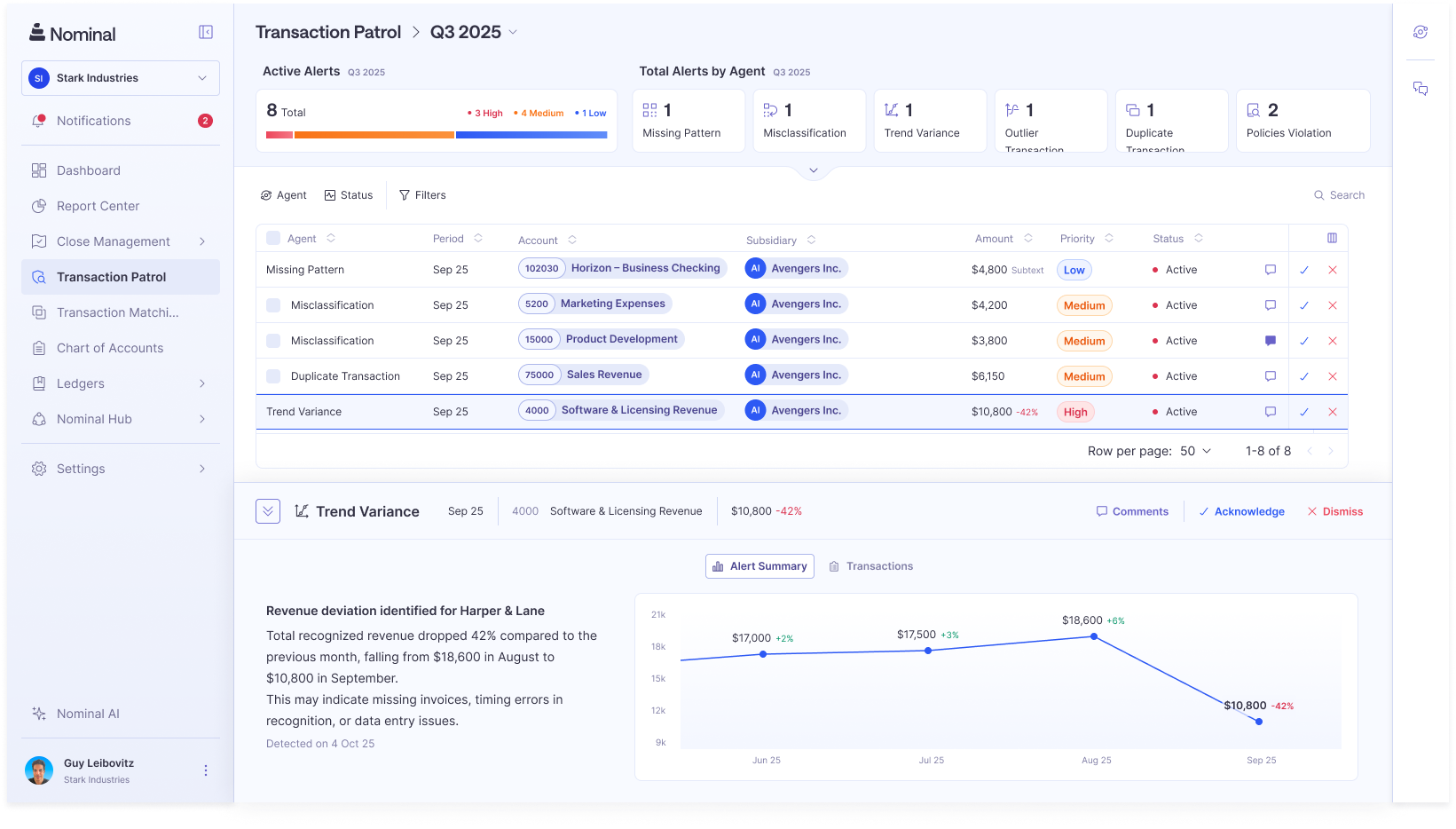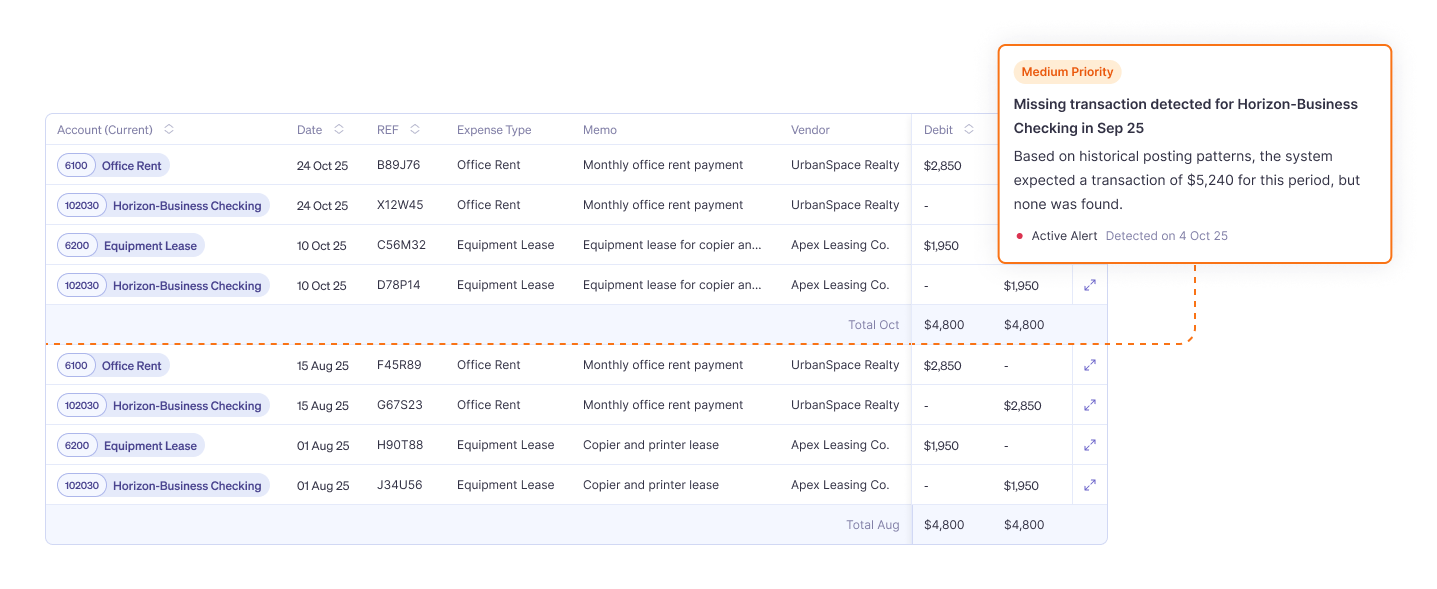
Transaction Patrol uses AI agents to continuously monitor general ledger activity across all entities, automatically detecting anomalies, misclassifications, and policy violations before they become audit findings or close-day emergencies.
Most finance teams know the feeling: you're days into the close, reconciling accounts, when someone spots a duplicate invoice that's been sitting in the books for weeks. Or worse, the auditors find a pattern of misclassified expenses that slipped through because no one had time to review thousands of entriess line by line. These aren't dramatic failures. They're the quiet erosion of data quality that happens when teams are stretched too thin to catch mistakes before they compound.
The reality is that reviewing hundreds or thousands of transactions to spot errors is nearly impossible for the human eye. Teams may catch issues during monthly close if they're extremely meticulous, or during audits, but many problems slip through due to data volume, time constraints, and human limitations. Finance leaders aren't asking for perfection. They're asking for a way to see the problems before they snowball.
Transaction Patrol changes that equation. It's an AI agent that continuously monitors every single activity across all your entities, not just samples and not just at month-end, but in real time. Think of it as your AI auditor that never sleeps, flagging anomalies before the close and giving your team the ability to run internal controls with a level of accuracy and granularity that wouldn't otherwise be possible.
What Is the Patrol Agent?
Transaction Patrol is a set of AI agents that monitor all general ledger activity from your ERP, spotting anomalies and finance policy violations automatically. Unlike traditional exception management tools that rely on rigid rules and manual configuration, Patrol uses large language models to understand context and identify the kinds of human mistakes that deterministic logic simply can't catch.


Here's what makes it different. Patrol agents scan your periodical ERP general ledger entries and process them using LLMs, each with specific instructions tailored to different types of errors. The system performs continuous transaction analysis across all your entities and systems, looking for patterns that signal trouble: duplicate activities, misclassifications, unusual spending patterns, and potential fraud.
When an agent detects an anomaly, it surfaces as an alert. From there, your team can see the relevant records in context, collaborate directly within the alert to investigate, and approve or dismiss the finding. No more switching between systems or digging through spreadsheets to understand what went wrong.
Currently live agents include:
- Missing Transactions: which identifies recurring transactions that suddenly drop off
- Misclassified Transactions: which flags accounting logic contradictions like a revenue transaction tagged with a vendor or a utility bill booked to payroll.
Additional agents for trend variance, duplicates, and outliers are coming soon, along with the ability to define custom patrol policies for your specific compliance requirements.
The Problem With Manual Exception Handling
Most finance teams rarely perform comprehensive record reviews because they lack the bandwidth for such a time-consuming process or don't have the resources to properly run internal audits. The close timeline is already compressed, and asking controllers to manually review transaction logs is unrealistic when they're juggling reconciliations, variance analysis, and reporting deadlines.
The cost of this gap is real. Errors caught late in the close process trigger fire drills. Mistakes that make it through to the auditors damage credibility and create rework during the busiest time of year. And some issues never surface at all, quietly distorting financial data until they compound into material problems.
Traditional tools don't solve this because they operate on reactive, rules-based logic. You can set thresholds for entry amounts or flag specific account codes, but these systems can't understand semantic context. They can't tell you that a transaction memo describing office supplies was mistakenly booked to travel expenses, or that a vendor suddenly stopped appearing in your recurring monthly entries. They create noise, not insight.
From Reactive to Proactive: How Patrol Flags Errors Before They Snowball
Transaction Patrol flips the script from reactive cleanup to proactive prevention. Instead of waiting for someone to request a review or stumbling across errors during reconciliation, patrol agents continuously scan your data and surface issues as they happen.


This shift matters because it changes the rhythm of your close process. Rather than spending the first week of close firefighting data quality problems, your team arrives at month end already knowing where the issues are. Controllers can investigate anomalies as they appear, when context is fresh and fixes are straightforward, instead of scrambling to untangle problems days later under deadline pressure.
The system prioritizes what actually needs your attention, cutting through the noise that makes traditional exception reports unusable. Patrol agents use intelligent alerts that distinguish between genuine anomalies and expected variations, so your team isn't drowning in false positives. And because the agents monitor internal controls in real time, they identify control gaps and high-risk transactions instantly, not after the fact.
This proactive approach improves data hygiene across the board. Teams reconcile balances faster because they're not chasing down mystery variances. They explain discrepancies more clearly because they caught the root cause early. And they close the books sooner because the heavy lifting of error detection happens continuously in the background, not in a frantic sprint at month end.
Patrol vs. Flux vs. Close Tools: What's the Difference?
Finance technology can feel like a crowded landscape, so it's worth clarifying where Transaction Patrol fits. Close management tools help you track tasks and timelines. They're excellent for workflow orchestration, but they don't analyze your activities data or tell you where errors are hiding. Flux and consolidation features handle intercompany eliminations and multi entity reporting, ensuring your numbers roll up correctly across the group.
Patrol operates at a different layer. It's watching the underlying transaction data itself, looking for patterns that signal mistakes before they affect your reconciliations or consolidated reports. You need all three capabilities working together: close tools to manage the process, flux and consolidation to handle structural complexity, and patrol agents to ensure the data feeding into everything else is clean.
The key differentiator is Nominal's shadow ledger. You can't identify general ledger anomalies unless you see and understand the full ERP general ledger and analyze it in context. Patrol agents have that complete view, which is why they can spot issues that fragmented systems miss. Other products in the market help maintain data hygiene using rule based configurations, but Nominal's solution is unique because it uses LLMs to spot human mistakes that can't be configured using deterministic rules.
You might also like: What Are Flux Agents? AI-Powered Variance Analysis for Finance Teams
Audit Readiness, Built In
One of the top enterprise selling features alongside matching, flux, and consolidation, Transaction Patrol is changing how finance teams prepare for audits. Instead of bracing for what the auditors might find, teams are arriving at audit season already knowing their data is clean.
Early beta customers have already identified hundreds of historical mistakes that were validated and corrected, giving them confidence heading into their annual audits. The feature supports better internal controls monitoring by flagging control gaps and high risk entries as they occur, not months later when the audit team points them out.
This isn't just about catching errors. It's about building a culture of continuous controls instead of periodic fire drills. When your team knows that patrol agents are monitoring transactions in real-time, the pressure to catch every mistake manually disappears. Finance leaders can focus on strategic work instead of constantly second guessing data quality.
Close With Confidence
Transaction Patrol gives finance teams something they rarely get: the ability to spot problems before they become crises. By continuously monitoring every record across all your entities and using AI to detect anomalies that humans simply can't catch at scale, Patrol transforms error detection from a manual burden into an automated safeguard.
The result is faster closes, cleaner data, and finance teams that spend less time firefighting and more time driving the business forward. Ready to see how Transaction Patrol can transform your close process? Book a demo to see patrol agents in action.





